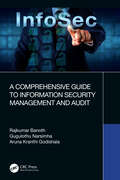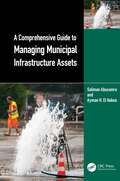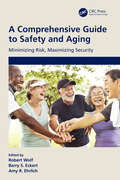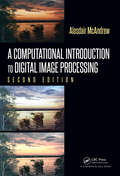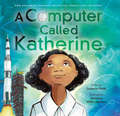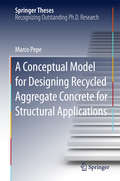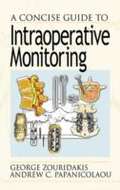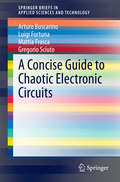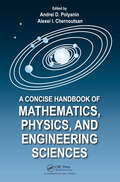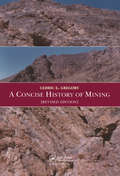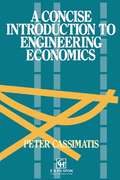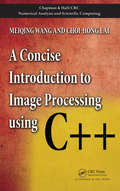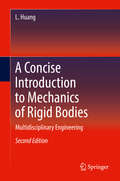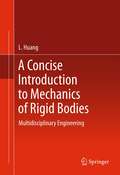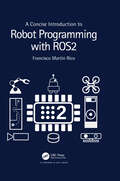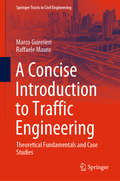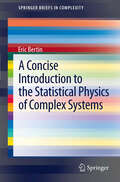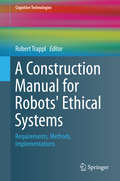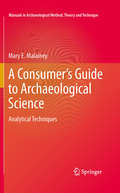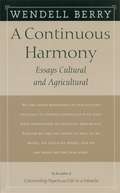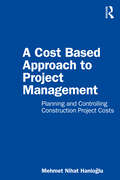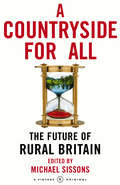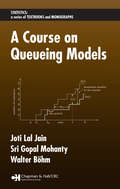- Table View
- List View
A Comprehensive Guide to Information Security Management and Audit
by Rajkumar Banoth Gugulothu Narsimha Aruna Kranthi GodishalaThe text is written to provide readers with a comprehensive study of information security and management system, audit planning and preparation, audit techniques and collecting evidence, international information security (ISO) standard 27001, and asset management. It further discusses important topics such as security mechanisms, security standards, audit principles, audit competence and evaluation methods, and the principles of asset management. It will serve as an ideal reference text for senior undergraduate, graduate students, and researchers in fields including electrical engineering, electronics and communications engineering, computer engineering, and information technology. The book explores information security concepts and applications from an organizational information perspective and explains the process of audit planning and preparation. It further demonstrates audit techniques and collecting evidence to write important documentation by following the ISO 27001 standards. The book: Elaborates on the application of confidentiality, integrity, and availability (CIA) in the area of audit planning and preparation Covers topics such as managing business assets, agreements on how to deal with business assets, and media handling Demonstrates audit techniques and collects evidence to write the important documentation by following the ISO 27001 standards Explains how the organization’s assets are managed by asset management, and access control policies Presents seven case studies
A Comprehensive Guide to Managing Municipal Infrastructure Assets
by Soliman Abusamra Ayman H. El HakeaComprehensive and practical, this book provides an essential resource for educators, researchers, students, and those in public agencies and consultancies who are directly responsible for managing municipal infrastructure such as roads, water, and sewer pipes. The book is thorough in the integration of procedures that establish a cost-effective intervention plan using the latest technologies and management processes. It examines all the aspects of developing an optimal asset management plan for collocated municipal assets. It presents the evolution of asset management from data requirements to investment planning and priority programming of rehabilitation and maintenance. It offers a coordinated approach to effectively manage municipal infrastructure and offers integrated solutions that aid decision-makers in taking informed decisions on (1) when to maintain each asset, (2) which corridors shall be prioritized, and (3) what is the best intervention to undertake for each asset. It also offers a compelling vision of how infrastructure and cities will evolve by 2050, shaped by advancements in digital technology, transportation, governance, sustainability, resilience, and climate change. It provides invaluable insights for practitioners,emphasizing how today’s decisions and investments will directly influence the future of urban environments.Features: Presents the most current methodologies and practical applications of managing collocated municipal infrastructure. Includes case studies and practical examples for each step, as well as an extensive list of references for each asset class. Examines novel approaches for reduced lifecycle costs, enhanced conditions, improved level of service, reduced risk, increased maintenance effectiveness, and reduced service disruptions. Explores the future of urban infrastructure in 2050, helping practitioners envision tomorrow’s cities and make informed investment decisions in today’s infrastructure.
A Comprehensive Guide to Safety and Aging: Minimizing Risk, Maximizing Security
by Robert Wolf Barry S. Eckert Amy R. EhrlichThis book is a comprehensive survey on safety for older adults. It contains contributions by experts from over a dozen disciplines, including physicians, audiologists, optometrists, mental health professionals, lawyers, occupational therapists, and policy makers. This multi-disciplinary approach provides a new and expansive conceptual framework for health care professionals, students, policymakers, and others who care for older adults, and promotes an understanding of the many challenges that adults face as they age. This book describes the complex range of issues that need to be considered when safeguarding older adults. We hope that this book will be of benefit to anyone currently working or training to work with older adults, helping them to fully appreciate the many safety issues that can arise. The book will be also be useful for both older adults and their caregivers, helping them to identify and address areas of concern. Our goal is to mitigate injury or other harm through an increased understanding of the risks encountered by older adults. This text will also appeal to professionals and graduate students in the fields of human factors and ergonomics, occupational health, and safety.
A Computational Introduction to Digital Image Processing
by Alasdair McAndrewHighly Regarded, Accessible Approach to Image Processing Using Open-Source and Commercial SoftwareA Computational Introduction to Digital Image Processing, Second Edition explores the nature and use of digital images and shows how they can be obtained, stored, and displayed. Taking a strictly elementary perspective, the book only covers topics that
A Computer Called Katherine: How Katherine Johnson Helped Put America on the Moon
by Suzanne SladeThe inspiring true story of mathematician Katherine Johnson--made famous by the award-winning film Hidden Figures--who counted and computed her way to NASA and helped put a man on the moon!Katherine knew it was wrong that African Americans didn't have the same rights as others--as wrong as 5+5=12. She knew it was wrong that people thought women could only be teachers or nurses--as wrong as 10-5=3. And she proved everyone wrong by zooming ahead of her classmates, starting college at fifteen, and eventually joining NASA, where her calculations helped pioneer America's first manned flight into space, its first manned orbit of Earth, and the world's first trip to the moon!Award-winning author Suzanne Slade and debut artist Veronica Miller Jamison tell the story of a NASA "computer" in this smartly written, charmingly illustrated biography.
A Conceptual Model for Designing Recycled Aggregate Concrete for Structural Applications (Springer Theses)
by Marco PepeThis book reports on the physical and mechanical characterization of Recycled Aggregate Concrete (RAC), produced through a partial-to-total replacement of ordinary aggregates with what have been dubbed Recycled Concrete Aggregates (RCAs). It proposes a theoretical framework for understanding the relationships between RCAs and RCA, and for predicting the resulting behavior of RAC. The book demonstrates that in the case of RAC two additional parameters have to be taken into account than with ordinary aggregates, due to the composite nature and higher porosity of RCAs. By extending Abrams' Law for Recycled Aggregate Concrete, it represents a first step in the formulation of a general model for predicting the properties of RAC. The theoretical approach presented here addresses an important gap in the literature and is expected to stimulate new research on the use of this more sustainable form of concrete in structural applications.
A Concise Guide To Intraoperative Monitoring
by George Zouridakis Andrew PapanicolaouCovering both the applications and the related theory, A Concise Guide to Intraoperative Monitoring provides a general but comprehensive introduction to IOM. Unlike existing texts that typically report the results of specific studies, this book presents comprehensive coverage of the entire procedure, as well as the specific protocols used in hospital practice, examples of typical recordings, possible problems, and recommended solutions. At the end of each chapter the author poses several questions for review. These questions help technologists and medical residents in their preparation for the board exams. Taken together, these features make the book an ideal reference or training manual. <p><p> A Concise Guide to Intraoperative Monitoring begins by discussing the basic principles underlying the generation of bioelectrical signals. It then describes the electronic equipment and the various electrophysiological procedures involved in IOM. From this foundation, the book gradually advances to more specific topics, such as surgical procedures, neuronal structures at risk, the optimum combinations of tests to administer, and the proper interpretation of test results. The material also provides you with a background on general anesthesia and analyzes the effects of various drugs on electrophysiological recordings. A Concise Guide to Intraoperative Monitoring also discusses the proper placement of stimulation and recording electrodes, as well as intervention strategies and equipment troubleshooting.
A Concise Guide to Chaotic Electronic Circuits (SpringerBriefs in Applied Sciences and Technology)
by Luigi Fortuna Arturo Buscarino Mattia Frasca Gregorio SciutoThis brief provides a source of instruction from which students can be taught about the practicalities of designing and using chaotic circuits. The text provides information on suitable materials, circuit design and schemes for design realization. Readers are then shown how to reproduce experiments on chaos and to design new ones. The text guides the reader easily from the basic idea of chaos to the laboratory test providing an experimental basis that can be developed for such applications as secure communications. This brief provides introductory information on sample chaotic circuits, includes coverage of their development, and the "gallery" section provides information on a wide range of circuits. Concise Guide to Chaotic Electronic Circuits will be useful to anyone running a laboratory class involving chaotic circuits and to students wishing to learn about them.
A Concise Handbook of Mathematics, Physics, and Engineering Sciences
by Andrei D. Polyanin Alexei ChernoutsanA Concise Handbook of Mathematics, Physics, and Engineering Sciences takes a practical approach to the basic notions, formulas, equations, problems, theorems, methods, and laws that most frequently occur in scientific and engineering applications and university education. The authors pay special attention to issues that many engineers and students
A Concise History of Mining
by Cedric.E. GregoryA history of mining. This revised edition in a way describes the history of civilization and the early development of nations. Where minerals and mining existed, they provided ingredients for weapons, wealth and world power. The text should be useful in today's period of developing countries.
A Concise Introduction to Engineering Economics
by P. CassimatisThis comprehensive yet accessible text emphasizes problem solving, evaluation of projects, capital budgeting and resource allocation under risk and uncertainty. Current theory of economics and finance is also discussed andthe text is complemented by a full set of problems, exercises and case studies.
A Concise Introduction to Image Processing using C++ (Chapman & Hall/CRC Numerical Analysis and Scientific Computing Series)
by Meiqing Wang Choi-Hong LaiImage recognition has become an increasingly dynamic field with new and emerging civil and military applications in security, exploration, and robotics. Written by experts in fractal-based image and video compression, A Concise Introduction to Image Processing using C++ strengthens your knowledge of fundamentals principles in image acquisition, conservation, processing, and manipulation, allowing you to easily apply these techniques in real-world problems. The book presents state-of-the-art image processing methodology, including current industrial practices for image compression, image de-noising methods based on partial differential equations (PDEs), and new image compression methods, such as fractal image compression and wavelet compression. It begins with coverage of representation, and then moves on to communications and processing. It concludes with discussions of processing techniques based on image representations and transformations developed in earlier chapters. The accompanying downloadable resources contain code for all algorithms.Suitable as a text for any course on image processing, the book can also be used as a self-study resource for researchers who need a concise and clear view of current image processing methods and coding examples. The authors introduce mathematical concepts with rigor suitable for readers with some background in calculus, algebra, geometry, and PDEs. All algorithms described are illustrated with code implementation and many images compare the results of different methods. The inclusion of C++ implementation code for each algorithm described enables students and practitioners to build up their own analysis tool.
A Concise Introduction to Mechanics of Rigid Bodies: Multidisciplinary Engineering
by L. HuangThis updated second edition broadens the explanation of rotational kinematics and dynamics -- the most important aspect of rigid body motion in three-dimensional space and a topic of much greater complexity than linear motion. It expands treatment of vector and matrix, and includes quaternion operations to describe and analyze rigid body motion which are found in robot control, trajectory planning, 3D vision system calibration, and hand-eye coordination of robots in assembly work, etc. It features updated treatments of concepts in all chapters and case studies. The textbook retains its comprehensiveness in coverage and compactness in size, which make it easily accessible to the readers from multidisciplinary areas who want to grasp the key concepts of rigid body mechanics which are usually scattered in multiple volumes of traditional textbooks. Theoretical concepts are explained through examples taken from across engineering disciplines and links to applications and more advanced courses (e. g. industrial robotics) are provided. Ideal for students and practitioners, this book provides readers with a clear path to understanding rigid body mechanics and its significance in numerous sub-fields of mechanical engineering and related areas.
A Concise Introduction to Mechanics of Rigid Bodies: Multidisciplinary Engineering
by L. HuangStatics and Dynamics of Rigid Bodies presents an interdisciplinary approach to mechanical engineering through a close evaluation of the statics and dynamics of rigid bodies, presenting a concise introduction to both. This volume bridges the gap of interdisciplinary published texts linking fields like mechatronics and robotics with multi-body dynamics in order to provide readers with a clear path to understanding numerous sub-fields of mechanical engineering. Three-dimensional kinematics, rigid bodies in planar spaces and numerous vector and matrix operations are presented in order to provide a comprehensive understanding of mechanics through dynamics and rigid bodies.
A Concise Introduction to Robot Programming with ROS2
by Francisco Martín RicoA Concise Introduction to Robot Programming with ROS2 provides the reader with the concepts and tools necessary to bring a robot to life through programming. It will equip the reader with the skills necessary to undertake projects with ROS2, the new version of ROS. It is not necessary to have previous experience with ROS2 as it will describe its concepts, tools, and methodologies from the beginning. Key Features Uses the two programming languages officially supported in ROS2 (C++, mainly, and Python) Approaches ROS2 from three different but complementary dimensions: the Community, Computation Graph, and the Workspace Includes a complete simulated robot, development and testing strategies, Behavior Trees, and Nav2 description, setup, and use A GitHub repository with code to assist readers It will appeal to motivated engineering students, engineers, and professionals working with robot programming.
A Concise Introduction to Traffic Engineering: Theoretical Fundamentals and Case Studies (Springer Tracts in Civil Engineering)
by Raffaele Mauro Marco GuerrieriThis book covers a selection of fundamental topics of traffic engineering useful for highways facilities design and control. The treatment is concise but it does not neglect to examine the most recent and crucial theoretical aspects which are at the root of numerous highway engineering applications, like, for instance, the essential aspects of highways traffic stream reliability calculation and automated highway systems control. In order to make these topics easy to follow, several illustrative worked examples of applications are provided in great detail. An intuitive and discursive, rather than formal, style has been adopted throughout the contents. As such, the book offers up-to-date and practical knowledge on several aspects of traffic engineering, which is of interest to a wide audience including students, researchers as well as transportation planners, public transport specialists, city planners and decision-makers.
A Concise Introduction to the Statistical Physics of Complex Systems (SpringerBriefs in Complexity)
by Eric BertinThis concise primer (based on lectures given at summer schools on complex systems and on a masters degree course in complex systems modeling) will provide graduate students and newcomers to the field with the basic knowledge of the concepts and methods of statistical physics and its potential for application to interdisciplinary topics. Indeed, in recent years, statistical physics has begun to attract the interest of a broad community of researchers in the field of complex system sciences, ranging from biology to the social sciences, economics and computer science. More generally, a growing number of graduate students and researchers feel the need to learn some basic concepts and questions originating in other disciplines without necessarily having to master all of the corresponding technicalities and jargon. Generally speaking, the goals of statistical physics may be summarized as follows: on the one hand to study systems composed of a large number of interacting 'entities', and on the other to predict the macroscopic (or collective) behavior of the system considered from the microscopic laws ruling the dynamics of the individual 'entities'. These two goals are, to some extent, also shared by what is nowadays called 'complex systems science' and for these reasons, systems studied in the framework of statistical physics may be considered as among the simplest examples of complex systems--allowing in addition a rather well developed mathematical treatment.
A Construction Manual for Robots' Ethical Systems: Requirements, Methods, Implementations (Cognitive Technologies)
by Robert TrapplThis book will help researchers and engineers in the design of ethical systems for robots, addressing the philosophical questions that arise and exploring modern applications such as assistive robots and self-driving cars. The contributing authors are among the leading academic and industrial researchers on this topic and the book will be of value to researchers, graduate students and practitioners engaged with robot design, artificial intelligence and ethics.
A Consumer's Guide to Archaeological Science: Analytical Techniques (Manuals in Archaeological Method, Theory and Technique)
by Mary E. MalaineyMany archaeologists, as primarily social scientists, do not have a background in the natural sciences. This can pose a problem because they need to obtain chemical and physical analyses on samples to perform their research. This manual is an essential source of information for those students without a background in science, but also a comprehensive overview that those with some understanding of archaeological science will find useful. The manual provides readers with the knowledge to use archaeological science methods to the best advantage. It describes and explains the analytical techniques in a manner that the average archaeologist can understand, and outlines clearly the requirements, benefits, and limitations of each possible method of analysis, so that the researcher can make informed choices. The work includes specific information about a variety of dating techniques, provenance studies, isotope analysis as well as the analysis of organic (lipid and protein) residues and ancient DNA. Case studies illustrating applications of these approaches to most types of archaeological materials are presented and the instruments used to perform the analyses are described. Available destructive and non-destructive approaches are presented to help archaeologists select the most effective technique for gaining the target information from the sample. Readers will reach for this manual whenever they need to decide how to best analyze a sample, and how the analysis is performed.
A Continuous Harmony: Essays Cultural and Agricultural
by Wendell BerryBerry's second collection of essays was first published in 1972, and contained eight essays, including the seminal "Think Little," which was printed in "The Last Whole Earth Catalogue" and reprinted around the globe, and the splendid centerpiece, "Discipline and Hope," an insightful and articulate essay of instruction and caution.
A Contractor's Guide to Planning, Scheduling, and Control
by Len HolmA MUST-HAVE, PRACTICAL GUIDE THAT CONNECTS SCHEDULING AND CONSTRUCTION PROJECT MANAGEMENT In A Contractor’s Guide to Planning, Scheduling, and Control, an experienced construction professional delivers a unique and effective approach to the planning and scheduling responsibilities of a construction project manager, superintendent, or jobsite scheduler. The author describes the complete scheduling cycle, from preconstruction and scheduling through controls and closeout, from the perspective of real-world general contractors and scheduling professionals. Filled with tools and strategies that actually help contractors build projects, and light on academic jargon and terminology that’s not used in the field, the book includes examples of real craft workers and subcontractors, like electricians, carpenters, and drywallers, to highlight the concepts discussed within. Finally, an extensive appendix rounds out the book with references to additional resources for the reader. This comprehensive guide includes: Thorough introductions to construction contracting, lean construction planning, subcontractor management, and more A comprehensive exploration of a commercial case study that’s considered in each chapter, connecting critical topics with a consistent through line End-of-chapter review questions and applied exercises Access to a companion website that includes additional resources and, for instructors, solutions, additional case studies, sample estimates, and sample schedules Perfect for upper-level undergraduate students in construction management and construction engineering programs, A Contractor’s Guide to Planning, Scheduling, and Control is also an irreplaceable reference for general contractors and construction project management professionals.
A Cost Based Approach to Project Management: Planning and Controlling Construction Project Costs
by Mehmet Nihat HaniogluA Cost Based Approach to Project Management: Planning and Controlling Construction Project Costs introduces early-career architects, construction managers, civil engineers, and facility managers to the essentials of delivering projects on-time and at cost. Drawing on the author’s decades of experience managing marquee building and infrastructure projects around the world, this primer offers busy professionals a crash course in budgeting, cost estimating, scheduling, and cost control. Chapters break down the details of cost elements, structuring project costs, and integrating budget with schedule, providing novice project managers with the key skills to plan and execute construction projects with confidence and precision. Features: Illustrates the principles of project management and the essentials of cost planning and control with easy-to-understand examples from the construction industry Includes step-by-step details of project planning, cost estimating, and management processes Offers clear, cost-based methods for defining scope, preparing bids, and planning for contingencies, as well as monitoring progress and determining when to take remedial action Contains a user-friendly guide to project management acronyms and terminology Provides sample construction schedules, budgets, and progress report forms An ideal resource for self-study, on-the-job training, or courses in construction, architecture, or civil engineering project management, A Cost Based Approach to Project Management makes a worthy addition to the aspiring project manager’s reference shelf.
A Countryside For All: The Future of Rural Britain
by Michael SissonsThe rural fuse has been lit. The countryside is tinder-dry. Post offices and banks, shops and schools are closing. Farmers are going out of business. Houses are becoming unaffordable as prices soar ad poverty grows. Pollution and over-exploitation are destroying landscapes. Many rural communities are on the verge of collapse. Some fear the foot- and - mouth crisis will prove to be the last straw. This book offers disturbing evidence of the background to the crisis.A Countryside For All is a rallying cry for action, pointing ways towards a presciption for the future. This volume tackles many of the issues in a variety of new and original ways. Possibly the most controversial and radical call is for the creation of a Department for the Countryside, with a Secretary of State for the Countryside- who would be responsible for setting a coherent set of policies to reverse the decline of rural Britain.This timely book outlines the main problems facing the countryside, and starts to bring together a balanced range of proposals. Thought-provoking, filled with common sense, often controversial but always fascinating, it points the way forward for the countryside, and for town and country as a whole.
A Course on Integral Equations with Numerical Analysis: Advanced Numerical Analysis (Mathematical Engineering)
by Tofigh Allahviranloo Armin EsfandiariThis book suggests that the numerical analysis subjects’ matter are the important tools of the book topic, because numerical errors and methods have important roles in solving integral equations. Therefore, all needed topics including a brief description of interpolation are explained in the book. The integral equations have many applications in the engineering, medical, and economic sciences, so the present book contains new and useful materials about interval computations including interval interpolations that are going to be used in interval integral equations. The concepts of integral equations are going to be discussed in two directions, analytical concepts, and numerical solutions which both are necessary for these kinds of dynamic systems. The differences between this book with the others are a full discussion of error topics and also using interval interpolations concepts to obtain interval integral equations. All researchers and students in the field of mathematical, computer, and also engineering sciences can benefit the subjects of the book.
A Course on Queueing Models
by Joti Lal Jain Walter Böhm Sri Gopal MohantyThe application of engineering principles in divergent fields such as management science and communications as well as the advancement of several approaches in theory and computation have led to growing interest in queueing models, creating the need for a comprehensive text. Emphasizing Markovian structures and the techniques that occur in differen
